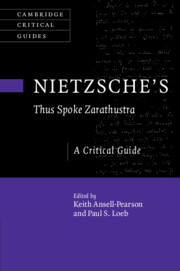
- Cited by 1
-
Cited byCrossref Citations
This Book has been cited by the following publications. This list is generated based on data provided by Crossref.
Low, Nicholas E 2024. Nietzsche’s holy jest: the ambivalence of laughter in Thus Spoke Zarathustra . International Journal of Philosophy and Theology, Vol. 85, Issue. 3-4, p. 124.
- Publisher:
- Cambridge University Press
- Online publication date:
- June 2022
- Print publication year:
- 2022
- Online ISBN:
- 9781108855143
- Series:
- Cambridge Critical Guides


